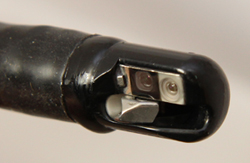Just a day after the announcement of the carbapenem-resistant Enterobacteriaceae (CRE) outbreak linked to endoscopes used to diagnose and treat pancreaticobiliary diseases at the UCLA Ronald Reagan Medical Center, the US Food and Drug Administration (FDA) issued a safety communication in regard to this particular medical device.

The purpose of the communication is to raise awareness among health care professionals, including those working in reprocessing units in health care facilities, that the complex design of ERCP endoscopes (also called duodenoscopes) may impede effective reprocessing.
Reprocessing is a detailed, multistep process to clean and disinfect or sterilize reusable devices. Recent medical publications and adverse event reports associate multidrug-resistant bacterial infections in patients who have undergone ERCP with reprocessed duodenoscopes, even when manufacturer reprocessing instructions are followed correctly. Meticulously cleaning duodenoscopes prior to high-level disinfection should reduce the risk of transmitting infection, but may not entirely eliminate it.
The FDA is closely monitoring the association between reprocessed duodenoscopes and the transmission of infectious agents, including multidrug-resistant bacterial infections caused by Carbapenem-Resistant Enterobacteriaceae (CRE) such as Klebsiella species and Escherichia coli.
In total, from January 2013 through December 2014, the FDA received 75 MDRs encompassing approximately 135 patients in the United States relating to possible microbial transmission from reprocessed duodenoscopes. It is possible that not all cases have been reported to the FDA.
Read the entire FDA alert HERE


3 thoughts on “FDA issues safety alert about ERCP endoscopes cleaning after UCLA outbreak”